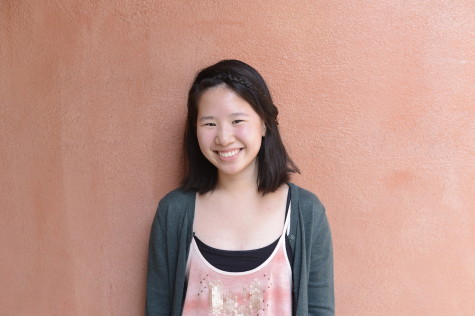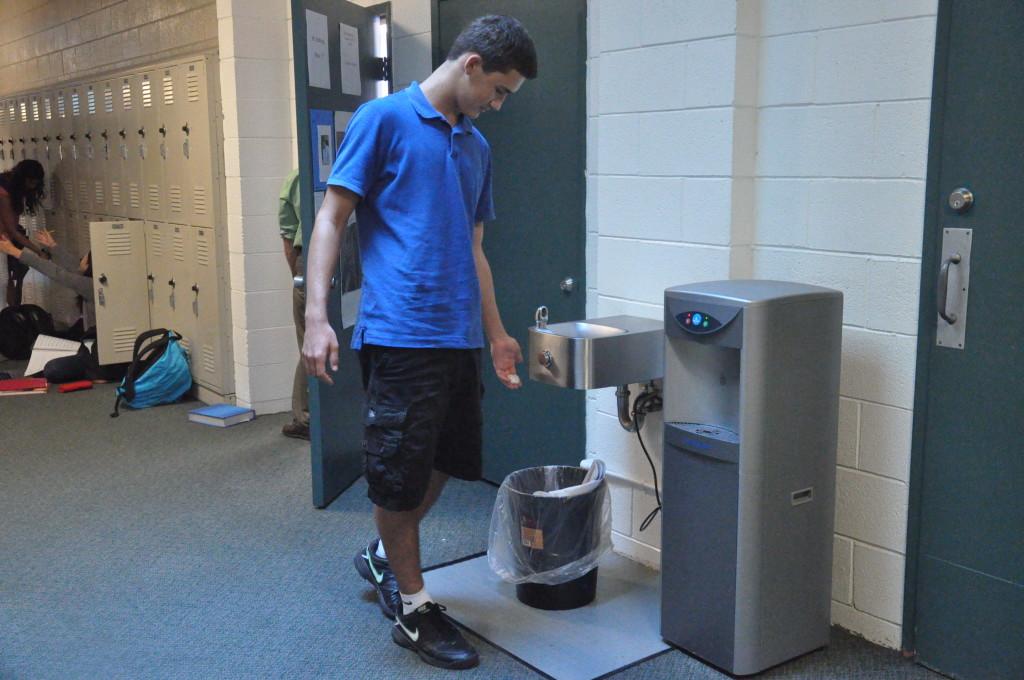New Harker Green Committee Urges Students to Think Eco-Friendly
During Tuesday’s school meeting, Spanish teacher Diana Moss introduced the newly-formed Harker Green Committee and presented ways for the Upper School community to be more eco-friendly.
Moss’s presentation not only suggested ways for students to be more green, such as using reusable water bottles and carpooling, but also clarified the types of waste that could be placed in the trash and recycling bins.
“There was a unanimous feeling that we can do much better than what we’re doing in terms of conserving energy, reducing our resources, creating an infrastructure that creates less of a carbon footprint, but also to create an education component [from] K -12 that helps our students understand about the importance of reducing our carbon footprint,” Moss said.
The Green Committee, formed last year, currently consists of around 30 staff members from the Lower, Middle, and Upper School and is committed to increasing the sustainability of all three campuses. The staff-only organization’s Upper School members are Andy Wicklund, Charles Shuttleworth, Christopher Nikoloff, Jeff Sutton, Kate Schafer, Lisa Radice, Mike Bassoni, Nicholas Manjoine, Susan Smith, Susan King, Nicole Hall, David Takamoto, and Victor Adler.
“It seems like a great plan; it’s good for the environment. It may be a little hard, [though] because I’m not sure all the people will listen to the rules,” Jonathan Schwartz (9) said about the trash guidelines announced at the meeting.
Although he does not consider himself an active environmentalist, he commented that he would follow the initiatives that the green committee has taken. Kristen Park (10) agreed with Schwartz, and noted that the apathy of some members of the community might lessen the impact of the rules.
“I think we need to be more aware of the environment, and I notice that some people don’t take recycling seriously because they’re just too lazy to walk,” Kristen said.
The committee’s first action involved an evaluation of the “greenness” of the campus by Paul Chapman, head of Inverness Associates. According to Green Committee Chairman, science teacher Jeff Sutton, the results showed that the school has integrated several green ideas, but that there is still room for improvement.
“I like what Mrs. Moss said this morning, and that is to just think. A lot of times, we go through our daily lives without thinking about how we do stuff,” Sutton said. “Think about what you do. Does it go in [the] recycling? Does it go in the trash? Is there a carpool? Are there ways to reduce?”
The committee plans to take a trash audit in the near future to determine how much school waste is recycled and how much is buried in landfills.
“One of the recommended ways to convince students, parents, teachers that there are real advantages both to the school and the environment is to do an audit,” said Green Committee member and English teacher John Heyes. “[We want to] find out what [our] baseline [is], where are we now and what we can do to shift that baseline. Going green actually saves an institution money.”
Students can pitch in by simply throwing trash into their respective bins, picking up litter around campus, and pitching ideas to student council on how to better the school environment.

Vivek Bharadwaj (12) is the co-Editor-In-Chief for the Winged Post. His favorite subject in school is computer science, and he enjoys swimming and watching...

Priscilla Pan is the features editor for the Winged Post and co-creator of In a Nutshell. She is a senior and has been part of the journalism program for...


















![“[Building nerf blasters] became this outlet of creativity for me that hasn't been matched by anything else. The process [of] making a build complete to your desire is such a painstakingly difficult process, but I've had to learn from [the skills needed from] soldering to proper painting. There's so many different options for everything, if you think about it, it exists. The best part is [that] if it doesn't exist, you can build it yourself," Ishaan Parate said.](https://harkeraquila.com/wp-content/uploads/2022/08/DSC_8149-900x604.jpg)




![“When I came into high school, I was ready to be a follower. But DECA was a game changer for me. It helped me overcome my fear of public speaking, and it's played such a major role in who I've become today. To be able to successfully lead a chapter of 150 students, an officer team and be one of the upperclassmen I once really admired is something I'm [really] proud of,” Anvitha Tummala ('21) said.](https://harkeraquila.com/wp-content/uploads/2021/07/Screen-Shot-2021-07-25-at-9.50.05-AM-900x594.png)







![“I think getting up in the morning and having a sense of purpose [is exciting]. I think without a certain amount of drive, life is kind of obsolete and mundane, and I think having that every single day is what makes each day unique and kind of makes life exciting,” Neymika Jain (12) said.](https://harkeraquila.com/wp-content/uploads/2017/06/Screen-Shot-2017-06-03-at-4.54.16-PM.png)








![“My slogan is ‘slow feet, don’t eat, and I’m hungry.’ You need to run fast to get where you are–you aren't going to get those championships if you aren't fast,” Angel Cervantes (12) said. “I want to do well in school on my tests and in track and win championships for my team. I live by that, [and] I can do that anywhere: in the classroom or on the field.”](https://harkeraquila.com/wp-content/uploads/2018/06/DSC5146-900x601.jpg)
![“[Volleyball has] taught me how to fall correctly, and another thing it taught is that you don’t have to be the best at something to be good at it. If you just hit the ball in a smart way, then it still scores points and you’re good at it. You could be a background player and still make a much bigger impact on the team than you would think,” Anya Gert (’20) said.](https://harkeraquila.com/wp-content/uploads/2020/06/AnnaGert_JinTuan_HoHPhotoEdited-600x900.jpeg)

![“I'm not nearly there yet, but [my confidence has] definitely been getting better since I was pretty shy and timid coming into Harker my freshman year. I know that there's a lot of people that are really confident in what they do, and I really admire them. Everyone's so driven and that has really pushed me to kind of try to find my own place in high school and be more confident,” Alyssa Huang (’20) said.](https://harkeraquila.com/wp-content/uploads/2020/06/AlyssaHuang_EmilyChen_HoHPhoto-900x749.jpeg)



